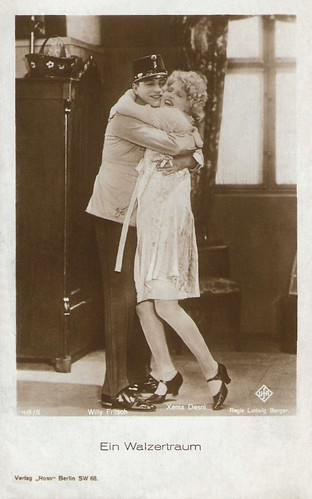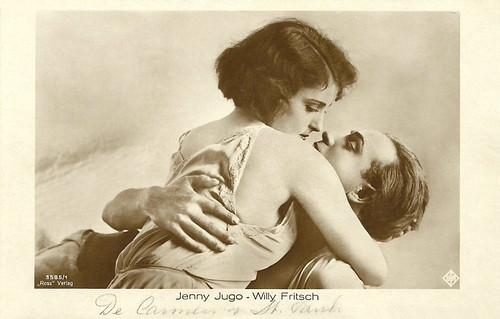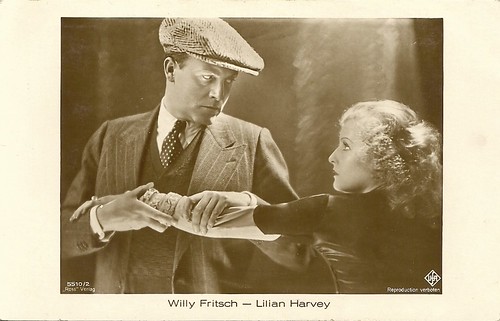
German postcard by Ross Verlag, no. 5062/2, 1930-1931. Photo: Harlip, Berlin.

German postcard by Ross Verlag, no. 1478/2, 1927-1928. Photo: Alex Binder / Ufa.

German postcard by Ross Verlag, no. 4227/2, 1929-1930. Photo: E.O. Hoppé, London.

German postcard by Ross Verlag, no. 4227/3, 1929-1930. Photo: E.O. Hoppé, London.

German postcard by Ross Verlag, no. 5504/1. Photo: Ufa.

German postcard by Ross Verlag, no. 6418/2, 1931-1932. Photo: Atelier Binder, Berlin / Ufa.

German postcard by Ross Verlag, no. 6746/1, 1931-1932. Photo: Ufa.

German postcard by Ross Verlag, no. 7870/2, 1932-1933. Photo: Ufa.

German postcard by Ross Verlag, no. 8469/1, 1933-1934. Photo: Ufa / Frhr. von Gudenberg.

German postcard by Ross Verlag, no. 8473/3, 1933-1934. Photo: Ufa / Frhr. von Gudenberg.
Sunny nature
Willy Fritsch (sometimes credited as Willi Fritsch) was born Wilhelm Egon Fritz Fritsch in Kattowitz in German Silesia (now Katowice, Poland), in 1901. He was the son of Lothar Fritsch, a farmer and machine manufacturer, and his wife Anni (née Bauckmann).
In 1912 he moved with his family to Berlin, where he planned to become a mechanic. In 1919 he took up acting lessons from the actor Gustav Sczimek.
Fritsch debuted with a small role at Max Reinhardt's famous Deutsches Theater. There and at the affiliated Kammerspiele (Chamber theatre) he was cast in smaller stage roles and played young lovers and comic parts. In 1922, he joined the Max Reinhardt Ensemble on its tour through Scandinavia.
From 1921 on, Fritsch began to appear as a supporting player in films, like the sound experiment Miss Venus (Ludwig Czerny, 1921).
In 1923, he auditioned for the leading role of a blind artist in the melodrama Seine Frau, die Unbekannte/His Mysterious Adventure (Benjamin Christensen, 1923), which was then re-written to fit his rather sunny nature.

German postcard by Ross Verlag, no. 36/3. Photo: May-Film / Ufa. Willy Fritsch and Lilian Hall-Davis in Der Farmer aus Texas/The Farmer from Texas (Joe May, 1925).

German postcard by Ross Verlag, no. 48/1. Photo: Ufa. Mady Christians and Willy Fritsch in Ein Walzertraum/The Waltz Dream (Ludwig Berger, 1925), based on the Oscar Straus operetta.

German postcard by Ross Verlag, no. 48/5. Photo: Ufa. Xenia Desni and Willy Fritsch in the German silent film Ein Walzertraum/The Waltz Dream (Ludwig Berger, 1925).

German postcard by Ross Verlag, no. 1390/1. 1927-1928. Photo: H. Gärtner / Eichberg-Film GmbH. Willy Fritsch in Der Prinz und die Tänzerin/The Prince and the Dancer (Richard Eichberg, 1926).

German postcard by Ross Verlag, no. 1390/2, 1927-1928. Photo: H. Gärtner / Eichberg Film. Willy Fritsch played under the direction of Richard Eichberg in the films Die keusche Susanne/The Girl in the Taxi (1926) with Lilian Harvey and Der Prinz und die Tänzerin/The Prince and the Dancer (1926) with Lucy Doraine.

French postcard, no. 194. Photo: Ufas / Isepa. Willy Fritsch possibly in the German-Swedish coproduction Die sieben Töchter der Frau Gyurkovics/ Flickorna Gyurkovics (Ragnar Hyltén-Cavallius, 1926).

German postcard by Ross Verlag, no. 81/4. Photo: Parufamet. Hans Adalbert Schlettow and Willy Fritsch in Der Letzte Walzer/The Last Waltz (Arthur Robison, 1927).

German postcard by Ross Verlag, no. 3585/1. Photo: Jenny Jugo and Willy Fritsch in Die Carmen von St. Pauli/Docks of Hamburg (Erich Waschneck, 1928).

German postcard by Ross Verlag, no. 104/2. Photo: Ufa. Publicity still for Ungarische Rhapsodie/Hungarian Rhapsody (Hanns Schwarz, 1928).

German collectors card by Ross Verlag in the series Vom Werden Deutscher Filmkunst - Der Stumme Film, picture, no, 173, Group 43. Photo: Ufa. Willy Fritsch in Spione/Spies (Fritz Lang, 1928).
Fritz Lang
Willy Fritsch convincingly played the would-be son of an aristocrat in Der Farmer aus Texas/The Farmer from Texas (Joe May, 1925), which made him the new star of the production company Ufa.
Next, he starred as the dashing Lieutenant Niki in Ein Walzertraum/A Waltz Dream (Ludwig Berger, 1925), which turned out to be a significant success in the USA. At AllMovie, Janiss Garza writes: "This UFA silent, based on an old operetta, is far more light-hearted and spirited than the moody, heavy-handed fare that generally came out of Germany."
Ufa intervened when United Artists offered Fritsch a contract. His next films, Der Prinz und die Tänzerin/The Prince and the Dancer (Richard Eichberg, 1926) and Der letzte Walzer/The Last Waltz (Arthur Robison, 1927) basically followed the formula of Ein Walzertraum.
Fritsch only occasionally altered his now well-established film image in Spione/Spies (1928) and Frau im Mond/Woman in the Moon (1929), both directed by Fritz Lang.
Hal Erickson notes at AllMovie: "Spies (Spione) was the first independent production of German 'thriller' director Fritz Lang. The years-ahead-of-its-time plotline involves Russian espionage activity in London. The mastermind is Haghi (Rudolph Klein-Rogge), a supposedly respectable carnival sideshow entertainer. Heading the good guys is Agent 326 (Willy Fritsch), with the help of defecting Russian spy Sonya (Gerda Maurus). The film moves swiftly to several potential climaxes, each one more exciting than its predecessor. Haghi's ultimate demise is a superbly staged Pirandellian vignette. Anticipating Citizen Kane by a dozen years, director Lang dispenses with all transitional dissolves and fade-outs, flat-cutting territory from one scene to another."

German postcard by Ross Verlag, no. 116/3. Photo: Ufa. Willy Fritsch in Melodie des Herzens (Hanns Schwarz, 1929).

German collectors card by Ross Verlag in the series Vom Werden Deutscher Filmkunst - Der Stumme Film, picture no. 138, group 40. Photo: Ufa. Willy Fritsch, Gerda Maurus and Gustl Stark-Gstettenbauer in Frau im Mond/Woman in the Moon (Fritz Lang, 1929).

German postcard by Ross Verlag, Berlin, no. 113/13. Photo: Fritz Lang-Film der Ufa. Gerda Maurus and Willy Fritsch in Frau im Mond/Woman in the Moon (Fritz Lang, 1929).

German postcard by Ross Verlag, no. 5510/2, 1930-1931. Photo: Ufa. Publicity still for the early sound film Einbrecher/Burglar (Hanns Schwarz, 1930), in which Fritsch is a burglar who gets an affair with a rich and neglected industrial wife (Lilian Harvey) of an industrial.

German collector card in the series Vom Werden deutscher Filmkunst - Der Tonfilm by Ross Verlag, album 11, no. 21. Photo: Ufa. Oskar Karlweis, Willy Fritsch and Heinz Rühmann in Die Drei von der Tankstelle/The Three from the Filling Station (Wilhelm Thiele, 1930).

German postcard by Ross Verlag, no. 5858/2, 1930-1931. Photo: Ufa. Publicity still for Im Geheimdienst/In the Employ of the Secret Service (Gustav Ucicky, 1931), a spy film set in Russia in World War One.

German collectors card in the series 'Vom Werden deutscher Filmkunst - Der Tonfilm', album no. 11, picture no. 23. Photo: Ufa / Ross Verlag. Käthe von Nagy and Willy Fritsch in Ihre Hoheit befiehlt/Her Grace Commands (Hanns Schwarz, 1931).

German postcard by Ross Verlag, no. 708. Photo: Ufa. Willy Fritsch in Ronny (Reinhold Schünzel, 1931). Song Text 'Wenn die Garde aufmarschiert'. Copyright: Ufaton, 1932.

German postcard by Ross Verlag, no. 6048/1, 1931. Photo: Ufa. Willy Fritsch as the Russian Czar Alexander I and his double in Der Kongress tanzt (Erik Charell, 1931).

German postcard by Ross Verlag, no. 131/6. Photo: Erich Pommer-Produktion / Ufa. Still with Lilian Harvey and Willy Fritsch in Der Kongress tanzt/The Congress dances (Erik Charell, 1931).
Lilian Harvey
Willy Fritsch took singing lessons to prepare himself for the sound film Melodie des Herzens/Melody of the Heart (Hanns Schwarz, 1929) with Dita Parlo.
His breakthrough came after being paired with Lilian Harvey in Liebeswalzer/The Love Waltz (Wilhelm Thiele, 1930) and the two were also engaged privately. Liebeswalzer established Harvey and Fritsch as the immensely popular 'dream team of the German cinema'.
Their next films such as Hokuspokus/Hocuspokus (Gustav Ucicky, 1930), the historical romance Der Kongress tanzt/Congress Dances (Erik Charell, 1931), Ein blonder Traum/A Blonde's Dream (Paul Martin, 1932) - co-written by Billy Wilder, and especially Die Drei von der Tankstelle/Three Good Friends (Wilhelm Thiele, 1930), were huge international box-office hits.
Fritsch and Harvey appeared together in twelve films. Each of these films featured several songs, which became popular hits and were also released on records, thereby further adding to the popularity of the two stars.
Hal Erickson at AllMovie: "If a poll had ever been conducted amongst fans of international musical-comedy star Lillian Harvey, the actress's most popular vehicle would probably have been Die Drei von Der Tankstelle (Three From the Gas Station) - with Congress Dances running a very close second. The story opens as three debt-ridden young men pool what is left of their savings to open a roadside service station. Their most frequent customer is the wealthy, winsome Ms. Harvey, who frequently shows up fetchingly clad in hiking shorts. Each of the young men falls in love with the girl, unbeknownst to the other two. Which one will she choose? Most likely, the one who sings the best - and that would be Lillian Harvey's frequent screen vis-a-vis Willy Fritsch."

German postcard by Ross Verlag, no. 143/4. Photo: Ufa. Willy Fritsch, Lilian Harvey and Willi Forst in the musical comedy Ein blonder Traum/Happy Ever After (Paul Martin, 1932).

German postcard by Ross Verlag, no. 6717/1, 1931-1932. Photo: Ufa. Willy Fritsch in Ein toller Einfall/A Mad Idea (Kurt Gerron, 1932).

German postcard by Ross Verlag, no. 6741/1, 1931-1932. Photo: Ufa. Willy Fritsch and Dorothea Wieck in Ein toller Einfall/A Mad Idea (Kurt Gerron, 1932).

German postcard by Ross Verlag, no. 6742/1, 1931-1932. Photo: Ufa. Else Elster and Willy Fritsch in Der Frechdachs/The Cheeky Devil (Carl Boese, Heinz Hille, 1932).

German postcard by Ross Verlag, no. 192/2, 1932-1933. Photo: Ufa. Publicity still for Walzerkrieg/Waltz Time in Vienna (Ludwig Berger, 1933). Collection: Geoffrey Donaldson Institute.

German postcard by Ross Verlag, no. 192/4. Photo: Ufa. Publicity still for Walzerkrieg (Ludwig Berger, 1933) with Rose Barsony.

German postcard by Ross Verlag, number invisible. Photo: Ufa. Willy Fritsch in the German musical comedy Saison in Kairo/Season in Cairo (Reinhold Schünzel, 1933).

German postcard by Ross Verlag, no. 8300/1, 1933-1934. Photo: Ufa. Willy Fritsch as Fürst Leopold von Anhalt-Dessau in Des jungen Dessauers grosse Liebe (Arthur Robison, 1933).

German postcard by Ross Verlag, no. 8934/1, 1933-1934. Photo: Ufa. Käthe von Nagy and Willy Fritsch in Prinzessin Turandot/Princess Turandot (Gerhard Lamprecht, 1934).

German postcard by Ross Verlag, no. 9172/3, 1935-1936. Photo: Ufa. Willy Fritsch in Amphitryon/Amphitryon - Happiness from the Clouds (Reinhold Schünzel, 1935).

German postcard by Ross Verlag, no. 9677/1, 1935 - 1936. Photo: Ufa. Publicity still for Boccaccio (Herbert Maisch, 1936) with Heli Finkenzeller.
Character actor
Willy Fritsch had a long-term contract with Ufa and was paid a monthly salary of 20,000 Reichsmark, which was doubled during the 1930s.
Eschewing his trademark sunny boy persona, Fritsch proved his range as a character actor in films like Ich bei Tag und Du bei Nacht/I by Day, You by Night (Ludwig Berger, 1932) co-starring Käthe von Nagy, Walzerkrieg/The Battle of the Walzes (Ludwig Berger, 1933) opposite Renate Müller, and the satirical romp Amphitryon/Amphitryon - Happiness from the Clouds (Reinhold Schünzel, 1935) with Paul Kemp.
Fritsch managed to survive the Hitler era without any loss of prestige. After the end of the war, he relocated to Hamburg. He spoofed his own image as the romantic lover in Film ohne Titel/Film Without a Title (Rudolf Jugert, 1947), and excelled as the comical conférencier in Herrliche Zeiten/Fun Times (Erik Ode, Günter Neumann, 1949).
Although still in high demand, Fritsch didn't find satisfying roles in West Germany's post-war cinema. He continued to appear on stage and in films until the early 1960s. He remained a popular figure, partly due to his work as the host of nostalgic radio shows. Since 1937, he was married to dancer and actress Dinah Grace until her death in 1963. They had two sons, Michael and Thomas. After his wife's death, he decided to retire.
With his son Thomas Fritsch he starred in his final film, Das hab ich von Papa gelernt/I Learned It from Daddy (Axel von Ambesser, 1964). In 1963 he published his memoir '… das kommt nicht wieder' (That will never come back), and in 1965 he was honoured with the Filmband in Gold, for his long and important work for the German film. Willy Fritsch died of heart failure in 1973 in Hamburg, Germany. He was 72.

German postcard by Ross Verlag, no. 9813/2. Photo: Ufa. Willy Fritsch in the German screwball comedy Glückskinder/ Lucky Kids (Paul Martin, 1936), also with Lilian Harvey and set in New York. The skyscraper behind Willy looks like the Bank of Manhattan Trust Building. Parallel to the German version a French version was shot: Les gais lurons, with Henry Garat instead of Fritsch.

German postcard by Ross Verlag, no. 9903/2, 1935-1936. Photo: Hammerer / Ufa. Willy Fritsch in Menschen ohne Vaterland/Men Without a Fatherland (Herbert Maisch, 1937).

Big German card by Ross Verlag. Photo: Hämmerer / Ufa. Maria von Tasnady and Willy Fritsch in Menschen ohne Vaterland/People without a fatherland (Herbert Maisch, 1937).

German postcard by Film-Foto-Verlag, no. A 3844/1, 1941-1944. Photo: Baumann / Ufa. From Tatiana.

West German postcard by Ufa Film-Foto. Photo: Arthur Grimm / CCC-Film / Allianz.

West German collector card. Photo: Pontus / Allianz / Michaelis. Willy Fritsch and Maria Litto in Die Verschleierte Maja/The Veiled Lady (Géza von Cziffra, 1951).

German postcard. Photo: K.L. Haenchen / Berolina Film / Herzog Film. Willy Fritsch in Mikosch rückt ein/Mikosch moves in (J.A. Hübler-Kahla, 1952).

West German postcard by Ufa Film-Foto. Photo: Arthur Grimm / CCC-Film / Allianz. Willy Fritsch in Stern von Rio/Adventure in Rio (Kurt Neumann, 1955).

German postcard by Filmbilder-Vertrieb Ernst Freihoff, Essen, no. 889. Photo: Lothar Winkler. Thomas Fritsch and Willy Fritsch.
Scenes with Willy Fritsch and Lilian Harvey in Die keusche Susanne/The Innocent Susanne (Richard Eichberg, 1926), the silent film in which they first appeared together. Source: SittichFan (YouTube).
Willy Fritsch tells Lilian Harvey that she is too good for an afternoon Love affair with Heinz Rühmann in Einbrecher/Murder fo Sale (Hanns Schwarz, 1930). Source: Taylormayes (YouTube).
Scene from Einbrecher/Murder fo Sale (Hanns Schwarz, 1930) with Willy Fritsch, Lilian Harvey, Heinz Rühmann and Kurt Gerron. He sings 'Ich lass mir meinen Körper schwarz bepinseln'. Composer: Friedrich Holländer. Source: SittichFan (YouTube).
Willy and Thomas Fritsch in Das hab ich von Papa gelernt/I Learned It from Father (Axel von Ambesser, 1964). Source: SittichFan (YouTube).
Sources: Filmportal.de, Stephanie D'heil (Steffi-line - German), Thomas Staedeli (Cyranos), Hal Erickson (AllMovie), IMDb and Wikipedia.
1 comment:
Hi!
I was flabbergasted when I saw how many wonderful postcard blogs there are in the blogosphere! I have been stumbling over gorgeous postcard images as I visit blog after blog after blog. My cheeks hurt from smiling! I love finding people with similar interests.
I am starting a postcard event called Postcard Friendship Friday. I'll put Mister Linky on my blog to keep us all connected. It would be wonderful if you could join, visit, and leave a comment on the other blogs who have joined the event too!
You don't even have to be a collector to join! There are zillions of postcard images on Flickr to pick from. Vintage, postcrossing, retro, personal travels, kitsch…… the list of postcard types is long!
I'll see you on Friday
Marie
PS Please comment back if you would like to join!
Post a Comment